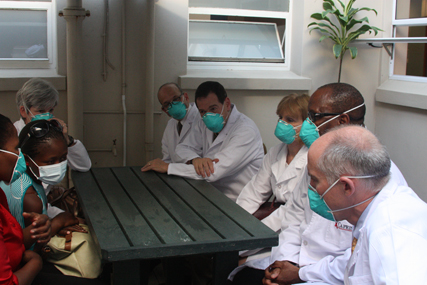U.S. Departments of Health and Human Services and Health Resources and Services Administration Senior delegates visit partner supported sites in South Africa

An HIV positive TB co-infected patient who receives her treatment through the Centre for AIDS Programme of Research in South Africa (CAPRISA) at the Cyril Prince Zulu Communicable Disease Centre shares her story with Ambassador Jimmy Kolker, Assistant Secretary for Global Affairs, Administrator Mary Wakefield, Health Resources and Services Administration, Dr. Austin Demby, Director, HHS-PEPFAR, Office of Global Affairs, Dr. Jose Morales, Director, Global HIV/AIDS Program, Health Resources and Services Administration, Steven Smith, the Health Attaché and HHS Regional Representative for Southern Africa, and Dr. Nancy Knight, CDC South Africa’s Country Director.
During a four-country trip to Southern Africa, Health and Human Services (HHS) Assistant Secretary Jimmy Kolker and Health Resources and Services Administration (HRSA) Administrator Mary Wakefield visited sites supported by HRSA through the Presidents Emergency Plan for AIDS Relief (PEPFAR). HRSA has supported PEPFAR programs since 2004, and currently supports technical cooperation initiatives in health workforce training and healthcare quality improvement.
On March 31 – the delegation visited two HRSA projects supported through I-TECH in South Africa. In South Africa, I-TECH supports training and capacity building with the South Africa Department of Correctional Services (DCS). DCS health systems have been unable to provide HIV testing and treatment for all inmates, and often are required to transport inmates to SAG health facilities for treatment. Prisons are particularly burdened with high rates of TB, including drug resistant TB patients who must be treated at government hospitals, and the delegation viewed first-hand the resource challenges for prison sick bays and medical professionals treating TB cases. I-TECH also supports a project to develop continuing professional development (CPD) for South African nurses, in collaboration with the South African Nursing Council (SANC). The SANC project has developed an initial CPD plan and pilot project with the goal to scale up and require all South Africa nurses to engage in CPD as a pre-requisite for nursing licensure renewals.
On April 1 – the delegation visited sites in Durban, including a project at the Osindisweni Hospital featuring the Twinning Center program in support of the development and training of clinical associates in South Africa. Osindisweni hospital is a clinical training site for the clinical associates program at the University of Pretoria, which is twinned with Arcadia University in Pennsylvania. Clinical associates are a new cadre of health professionals, with training and competency between a nurse and a doctor, similar to physician assistants in the United States. The addition of clinical associates is intended to help address the acute shortage of clinical health professionals. At Osindisweni clinical associates are deployed to provide clinical support for voluntary male medical circumcision, ante-natal care, and trauma care at the out-patient department. The delegation visited CAPRISA (The Center for AIDS Program and Research in South Africa), a world-renowned HIV and TB research and treatment site. CAPRISA was established in 2002 with NIH support, and has successfully integrated clinical treatment and high impact TB and HIV/AIDS research. PEPFAR has supported CAPRISA service delivery programs since 2004.